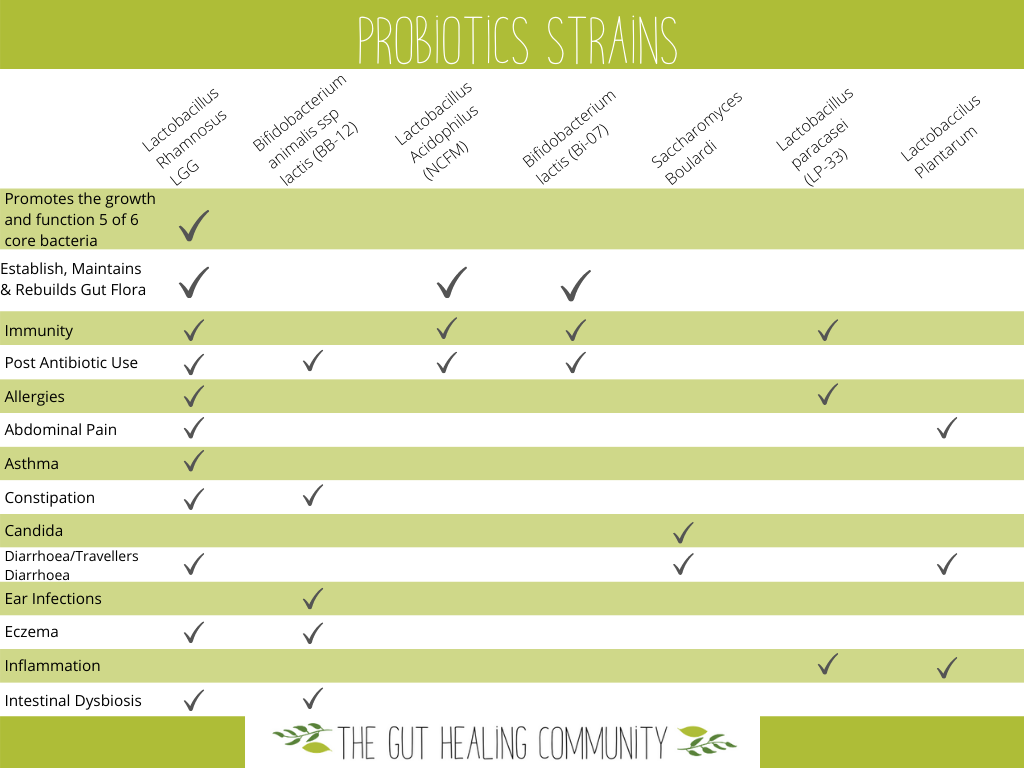Your ultimate guide to the best probiotics for kids
Gut health and probiotics for kids are hot topics at the moment. We now know that a healthy gut can affect so many other areas of health, particularly in children, including immunity, skin issues and inflammation.
Probiotics have been shown to help with constipation, diarrhoea, allergies, eczema and the immune system. More recently they have also been linked to toddler behaviour as well as helping kids on the autism spectrum.
Meagan from The Gut Healing Community shares her guide to selecting the most suitable probiotics for kids.
Probiotics are live microorganisms that, at the right dose, deliver health benefits.
Are you confused about the best probiotic for kids?
You aren’t alone, there are so many supplement companies on the market and so many different types, it is hard to know how to make an informed choice when choosing a probiotic.
Firstly, it’s important to identify that there is no one great probiotic for kids. Like adults, children have different gut bugs and different symptoms so there isn’t a universal strain to suit everyone.
However, there are aspects to take into consideration when deciding on the best probiotic for kids.
1. THE STRAIN
Probiotics are broken down into strains. Different strains can exert different actions in the gut.
See the table below for some of the different strains and how they help the gut and digestive health.
When choosing a probiotic ensure it includes some of these important strains. Varying your probiotic over a period of time is also a good way to increase your child’s gut microbiome. If there isn’t something specific that you are addressing like constipation etc with a strain specific probiotic then including a multi-strain probiotic is a great way to boost gut bacteria over the long term.
2. THE STORAGE METHOD
Probiotics are live bacteria and the way in which they are stored can affect their life span and therefore efficacy. Probiotics can be affected by 3 things:
Light
Temperature
Moisture
Do they need to be kept in the fridge?
Not always, modern storage of probiotics has come a long way and some probiotics no longer need to be kept in the fridge.
Companies aim to control as many of the 3 factors; light, temperature and moisture with their probiotics. For example: Fridge probiotics control light and temperature really well and then less on the moisture side of things, where as a shelf stable probiotic controls more the light and moisture with less control over the temperature. Note: Some shelf stable probiotics control their 3 measures with different types of packaging. Some use blister packs to ensure no moisture and less light and some of the bigger supplement companies have designed specific technology with double walled insulation and moisture absorbing packaging to control moisture and reduce light in their specific bottles.
3. NO NASTY FILLERS OR BINDERS
Some probiotic companies put fillers and inactive binders to bulk up the space in the capsule. Avoid binders and fillers such as magnesium stearate, silica, titanium dioxide.
Also choose one that is free from common allergens such as milk/casein, eggs, fish, shellfish, wheat/gluten, peanuts, tree nuts, yeast, corn or soy and that it is grown on a dairy-free, soy-free, vegetarian, non-GMO culture.
4. OTHER ASPECTS TO CONSIDER WHEN CHOOSING PROBIOTICS FOR KIDS:
Type of storage:
When choosing a probiotic, the bottle should always be in a dark container and stored away from direct sunlight. If you can, purchase one with a longer expiry date. That way there will be more CFU (colony forming units) than one that is about to expire.
Supplements vs Gummies vs Bars vs Foods, which one?
Some of the gummies and chewable probiotics targeted to kids or packaged probiotic foods like bars you’ll find in the supermarket, simply don’t have a high enough dosage to gain any significant health benefits. Better to stick with a reputable company that provides powders or aim to get your probiotics from food sources instead. See below for food probiotic ideas.
Maintain original storage:
If you are moving the probiotics to a webster pack or a pill container for ease of use or travelling purposes ensure, that you only pack 2-3 at a time. If the probiotics have left their original packaging then their efficacy and life span may be compromised.
Reputable Company:
Choose your probiotics from a reputable company. It’s best to buy from a health food store or directly through a practitioner, either a naturopath or nutritionist or behind the counter at your pharmacy. Avoid brands from the supermarkets.
Remember probiotics aren’t a magic cure.
Whilst supplementing with probiotics play an important role, so too does eating a wholefoods diet that has lots of variety of fresh foods. The more variety with the foods your kid’s eat, the greater diversity of gut bacteria.

FOODS TO HELP GUT HEALTH
Another way to help kids with their gut and digestive health is to ensure that they get pre and probiotics through their food. By including sources of fermented foods in your family’s diet, you create a diverse range of gut flora. Fermented foods include yoghurt, kefir, kimchi, sauerkraut, kombucha, miso, tempeh and fermented vegetables.
The easiest fermented foods to start kids on are yoghurt and kefir. Check the label to make sure the yoghurt you choose has live and active cultures. Or you can make your own with a starter culture. Start slow with the other types of fermented foods as the sour flavour can be quite strong for little ones so it’s a good idea to build them up slowly.
References:
Want to know more about making fermented foods for your family? Sign up to the wait list for my Fermented Course.
 Meagan is the owner and founder of The Gut Healing Community. She loves nothing more than finding ways to support other families and give them the information she wishes she had, right from the start of her healing journey. She is mum to Meika, wife to Scotty and an all round gut health nut.
Meagan is the owner and founder of The Gut Healing Community. She loves nothing more than finding ways to support other families and give them the information she wishes she had, right from the start of her healing journey. She is mum to Meika, wife to Scotty and an all round gut health nut.
Disclaimer:
This blog is for educational purposes only. It is not intended to be a substitute for professional medical advice and should not be relied on as health or personal advice.
Always seek the guidance of your doctor or other qualified health professional with any questions you may have regarding your health or a medical condition. Never disregard the advice of a medical professional, or delay in seeking it because of something you have read on this Website.





